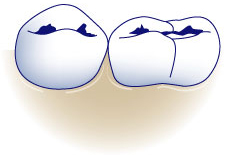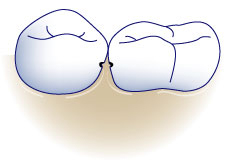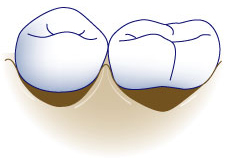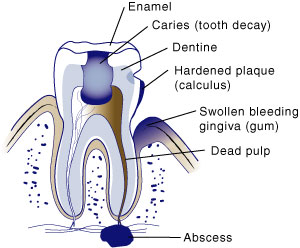What is tooth decay?
Dental caries is the process of tooth decay. It occurs when bacteria called dental plaque, consume sugar and produce acid that dissolves tooth enamel and dentine. Immediate treatment in the form of restoration (ie filling) is essential.
The first stage of tooth decay is called demineralisation, and it can be reversed at this time.
The 3 different types of caries
Fissure Caries
Fissure caries occur because plaque becomes trapped in the bottom of the grooves in the top of the tooth where the enamel is very thin and easily penetrated by the plaque acid. This is the most common form of caries in children.

Proximal Caries
Proximal caries occur when plaque is allowed to accumulate between the teeth. These areas are difficult to reach with a brush and caries occurs here in patients who do not floss.

Root Caries
Root caries occur following bone loss and/or gum recession. Because the roots are not protected by enamel, caries progresses very quickly.

Factors affecting dental caries
Plaque
Plaque produces acid, dissolving the enamel. Saliva neutralises the plaque acid and contains minerals to repair the tooth structure. However, the bacteria is held together by a sticky film that excludes the saliva. If the plaque is not removed the tooth underneath it is constantly being dissolved and never repaired, leading to caries formation. Regular tooth brushing and flossing are essential to remove the plaque and let the saliva do its job.
Saliva
Our saliva is the body’s natural defence against caries. We all have an individual saliva flow rate and mineral composition. It takes about two hours of normal flow to remove the plaque acid produced after eating and return the mouth to resting phase. You can speed the process up by chewing a sugar free gum for 5-10 mins. Smoking, stress, some medications, and caffeine and alcohol drinks slow down the saliva production and increase the risk of caries. Minimising these factors and drinking tap water to keep well hydrated will make the most of your saliva.
Diet
Plaque bacteria live on carbohydrates, in particular, sugars. By limiting sugary snacks, or eating them with meals, you are reducing the amount of damage the plaque acid can do. The consistency of the food is important too. Sticky lollies or dried fruit, for example, are in your mouth longer as they stick to the tooth surface.
Time
Time could be a factor if you are eating or drinking anything containing sugar more frequently than every 2 hours. Your mouth would never get a chance to rest. The longer the time your teeth are in an acid environment the more likely they are to decay. Caries doesn’t form overnight. Long term bad habits in diet and or cleaning, or deficencies in your saliva, are to blame. If you are unsure if you are putting yourself at risk, talk to your dentist or hygienist.
Tooth structure
Your tooth structure or shape can affect caries as some teeth have deeper groves than others, making cleaning more difficult. Fissure sealants can be placed in these grooves to reduce the risk of caries. You can strengthen your enamel by using fluoride toothpaste regularly. Fluoride works to prevent caries because when it is incorporated into the enamel structure is takes a stronger acid to dissolve the tooth. Fluoride supplements, like any medication, need to be in a dose appropriate to your age and decay rate.
Protection
Your best protection against dental caries is daily brushing, flossing, using fluoride toothpaste and maintaining regular dental visits.
If you think you have a high caries rate, talk to your dentist or hygienist about toothbrushing and flossing techniques and aids, remineralising agents and fluoride treatments, saliva testing, fissure sealants or dietary counselling. Your dental hygienist will remind you of the importance of cleaning your teeth, and how best to keep them clean.
Diseased Tooth

Tooth caries are repaired with fillings. This is known as restorative dentistry.
Arrange an appointment right now
Start the process of achieving a better smile today by arranging an appointment. Just call us or if out of hours use our simple request a callback from and we will call you back when we are open.
Call 9379 1893
"*" indicates required fields